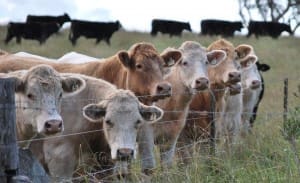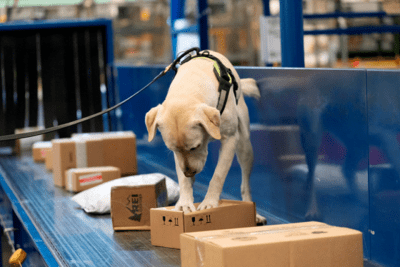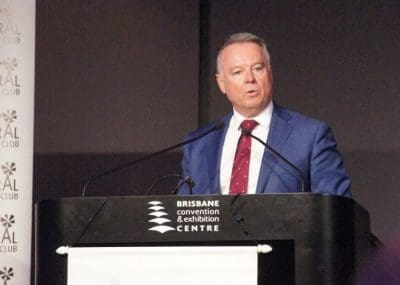The Federal Government has abandoned plans to introduce a biosecurity levy, which had been a central plank of its strategy to boost resourcing of border security to protect the multi billion dollar agricultural sector.
The Biosecurity Imports Levy was a recommendation of the 2017 Independent review of the capacity of Australia’s biosecurity system, which identified gaps and risks in Australia’s biosecurity system and found the national system was underfunded.
 The Federal Government subsequently announced it would introduce a biosecurity levy on importers in the 2018-19 Federal Budget.
The Federal Government subsequently announced it would introduce a biosecurity levy on importers in the 2018-19 Federal Budget.
Agriculture minister David Littleproud noted at the time those who create risk should proportionately fund biosecurity screening, adding that if taxpayers covered the full cost importers would not take their part of the responsibility of keeping Australia free from exotic threats seriously.
However, the plan encountered significant pushback from importers and industry groups who warned the levy would reduce the competitiveness of Australia’s freight supply chain and result in higher costs for consumers.
Implementation was delayed while the government considered feedback from impacted industry sectors on the proposed levy design.
In September last year a lack of progress prompted shadow agriculture minister Joel Fitzgibbon to accuse the Government of dragging the chain on solving the biosecurity resourcing issue.
In December then Minister for Agriculture Bridget McKenzie announced a levy would be applied onshore to importers who use the biosecurity system and established an industry work group to help with the levy design.
Levy abandoned
However this morning the Department of Agriculture, Water and the Environment (DAWE) announced that after further consideration of the impacts on industry, the Australian Government has now made the decision not to proceed with the onshore biosecurity levy.
It said the co-design process undertaken with the working group to develop a levy model that was practical for industry and the government highlighted that “a levy could not be implemented without significant regulatory impacts on industry and proposed levy payers”.
This decision had also been made in consideration of the ongoing impacts of drought, bushfires and COVID-19 on the Australian economy and the rapidly changing global trade environment, a DAWE statement said.
“The department would like to thank the Industry Working Group and other stakeholders who provided valuable input and feedback on the proposed levy design.
 “A levy will not be progressed and this decision will not impact on the overall biosecurity budget.
“A levy will not be progressed and this decision will not impact on the overall biosecurity budget.
“Australia’s biosecurity system will continue to be funded through existing arrangements.
“Since 2012-13, budget for biosecurity programs has increased by more than 40 per cent, or almost $250 million, with approximately $850 million available in 2019-20.
“Biosecurity is vital for Australia. It delivers important benefits to the community, the environment, our farmers, importers and exporters.
“Australia’s biosecurity system also underpins $60 billion in agricultural production, $49 billion in agricultural exports and $42 billion in inbound tourism.
“The department will continue to work with industry and the government to ensure Australia’s biosecurity system manages the risks of pests and diseases now and into the future.”
Industry group welcomes end to levy plans
The Australian Industry Group said it weclomed the news the levy will not proceed, saying it would have put additional costs on all imports based on volume.
“This would have been particularly costly and an unnecessary burden for high-volume low-value goods often used in manufacturing,” Innes Willox, Ai Group Chief Executive said.
RELATED: Govt urged to ‘urgently expand’ biosecurity dog numbers
RELATED: 55pc drop in detection dogs punctures Federal Govt biosecurity claims
RELATED: The thin biosecurity line shielding Australia’s $18b beef industry
“The integrity of Australia’s biodiversity is both a national asset and a collective responsibility and the proposed implementation of an import levy that was not risk-based put at risk Australia’s reputation as a strong advocate for a rules-based trading system.
“The global disruption to supply chains caused by COVID-19 has put significant pressure on Australian industry and we appreciate the Government has listened to industry representations, including from Ai Group, that there was limited capacity to accommodate this additional cost at this time.”
Morrison must commit to properly resourcing biosecurity: Fitzgibbon
Federal shadow minister for agriculture and resources Joel Fitzgibbon said the Federal Government had spent three years “dithering and stumbling” over the Biosecurity Imports Levy proposal.
 He said Dr Wendy Craik’s 2017 review of the Intergovernmental Agreement on Biosecurity identified concerning gaps and risks in Australia’s biosecurity system, including a warning about the risks posed by cruise ships.
He said Dr Wendy Craik’s 2017 review of the Intergovernmental Agreement on Biosecurity identified concerning gaps and risks in Australia’s biosecurity system, including a warning about the risks posed by cruise ships.
The review found significant additional resourcing would be needed to overcome the shortcomings, and recommended a levy be placed on incoming shipping containers.
The Government’s response was a levy which was to raise around $300 million.
“The proposed Biosecurity Imports Levy was poorly designed and lacked industry consultation. The Morrison Government failed to implement the levy on its own proposed start dates in July and September last year, following the production of a flawed levy design and an understandable backlash from industry,” Mr Fitzgibbon.
“The Government has now given up.
“In this COVID environment industry will understandably welcome the decision to drop the levy now the government has decided it’s all too hard.
“In recent months the Australian community has developed a heightened awareness of the importance of a sound biosecurity system.
“It’s the same biosecurity system which protects our key competitive advantage in global agriculture markets: our reputation as a producer and provider of clean, green and safe food and fibre.
“The Morrison Government must immediately explain how it’s going to address the biosecurity system’s shortcomings without a levy.”

A crazy decision. I can just imagine the swear words coming from prawn and pig farmers. With the Buy Australian social media campaigns and sentiment in the general community I would have thought this was the ideal time to adapt this levy.